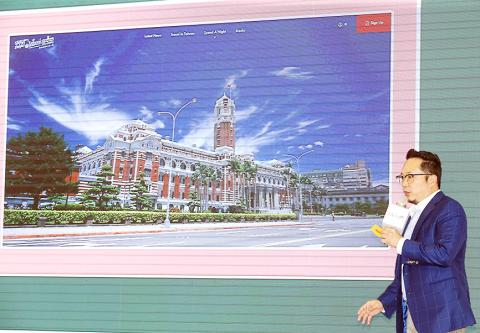The Presidential Office Building is at the center of a new tourism development program, with foreigners being offered a chance to spend the night in the building’s compound and become an “ambassador for Taiwan.”
The “Spend a Night at Taiwan’s Presidential Office Building” program is aimed at changing the building’s image as a former symbol of authoritarianism to mark its 100th anniversary and promoting Taiwan as “one of the friendliest nations in the world, the General Association of Chinese Culture (GACC), which is organizing the program, said in a statement.
The program “is the first of its kind in the world and demonstrates Taiwan’s democracy, freedom and openness,” Presidential Office spokesman Xavier Chang (張惇涵) said.

Photo: CNA
Applicants must be older than 20 and must make a video explaining why they want to visit Taiwan, what it is about Taiwan that attracts them and why they should be selected, Chang said.
The association said it plans to accept 10 groups of up to two people each in the first phase of the program, with one sleepover scheduled per week.
Guests would stay in a 14 ping (46.3m2) space in the Lixing Building with a view of the Presidential Office Building, which GACC described as a “true presidential suite.”
A personal housekeeper and breakfast would be provided, as well as an opportunity to attend the daily flag-raising ceremony and tour the Presidential Office Building, it said.
The stay would also include a customized itinerary, GACC deputy secretary-general Lee Hou-ching (李厚慶) said.
The first visitors would be welcomed in October, Chang said.
Those selected for the program would have to arrive before 10pm and leave no earlier than 5am the following day, for security reasons, the Presidential Office said.
A three-member panel would review the applications and select the winners: comedian and TV host Ugur Rifat Karlova, better known as Wu Feng (吳鳳); cultural commentator Chan Wei-hsiung (詹偉雄); and travel blogger Alston Hsu (許傑).
The reach of an applicant’s influence would be an important factor in the decision, Karlova said.
Hsu told reporters that applicants’ online visibility would be very important.
The application period began yesterday and will be open through the end of the month.
Applications can be submitted through the English-language Web site: www.nightattaiwan.tw/en.
Asked if Chinese nationals would be eligible to apply, Chang said the contest was open to all non-Republic of China (ROC) passport holders who meet the qualifications.

The CIA has a message for Chinese government officials worried about their place in Chinese President Xi Jinping’s (習近平) government: Come work with us. The agency released two Mandarin-language videos on social media on Thursday inviting disgruntled officials to contact the CIA. The recruitment videos posted on YouTube and X racked up more than 5 million views combined in their first day. The outreach comes as CIA Director John Ratcliffe has vowed to boost the agency’s use of intelligence from human sources and its focus on China, which has recently targeted US officials with its own espionage operations. The videos are “aimed at

STEADFAST FRIEND: The bills encourage increased Taiwan-US engagement and address China’s distortion of UN Resolution 2758 to isolate Taiwan internationally The Presidential Office yesterday thanked the US House of Representatives for unanimously passing two Taiwan-related bills highlighting its solid support for Taiwan’s democracy and global participation, and for deepening bilateral relations. One of the bills, the Taiwan Assurance Implementation Act, requires the US Department of State to periodically review its guidelines for engagement with Taiwan, and report to the US Congress on the guidelines and plans to lift self-imposed limitations on US-Taiwan engagement. The other bill is the Taiwan International Solidarity Act, which clarifies that UN Resolution 2758 does not address the issue of the representation of Taiwan or its people in

US Indo-Pacific Commander Admiral Samuel Paparo on Friday expressed concern over the rate at which China is diversifying its military exercises, the Financial Times (FT) reported on Saturday. “The rates of change on the depth and breadth of their exercises is the one non-linear effect that I’ve seen in the last year that wakes me up at night or keeps me up at night,” Paparo was quoted by FT as saying while attending the annual Sedona Forum at the McCain Institute in Arizona. Paparo also expressed concern over the speed with which China was expanding its military. While the US

SHIFT: Taiwan’s better-than-expected first-quarter GDP and signs of weakness in the US have driven global capital back to emerging markets, the central bank head said The central bank yesterday blamed market speculation for the steep rise in the local currency, and urged exporters and financial institutions to stay calm and stop panic sell-offs to avoid hurting their own profitability. The nation’s top monetary policymaker said that it would step in, if necessary, to maintain order and stability in the foreign exchange market. The remarks came as the NT dollar yesterday closed up NT$0.919 to NT$30.145 against the US dollar in Taipei trading, after rising as high as NT$29.59 in intraday trading. The local currency has surged 5.85 percent against the greenback over the past two sessions, central